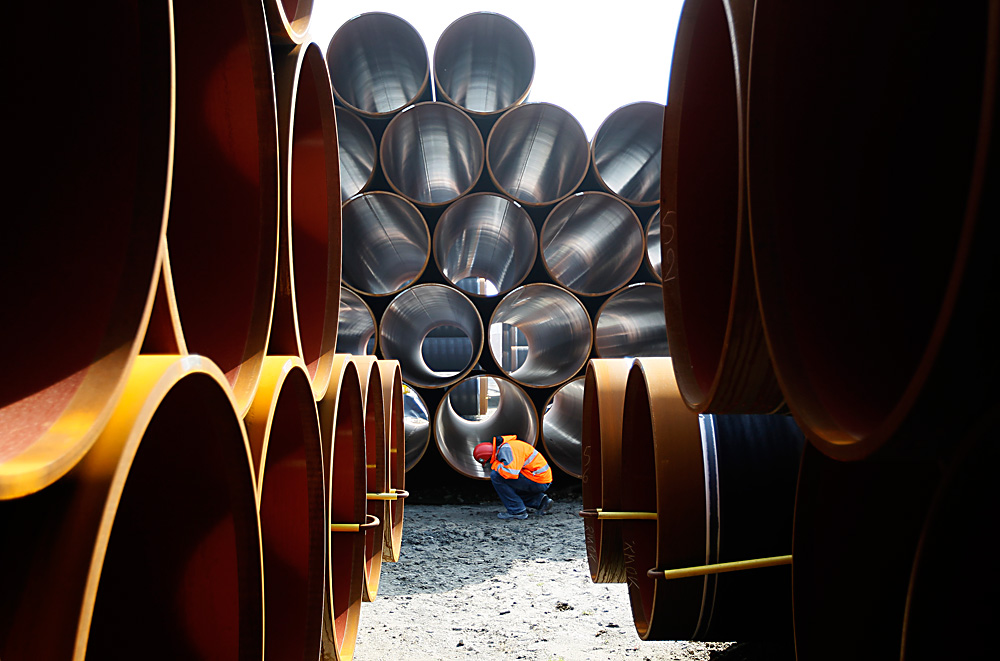
The Nord Stream 2 gas pipeline, with a capacity of 55 billion cubic meters, is to be laid under the Baltic Sea from Russia to Germany.
ReutersThe leaders of eight European countries – the Czech Republic, Estonia, Hungary, Latvia, Poland, Slovakia, Romania and Lithuania – have sent a letter to European Commission President Jean-Claude Juncker, objecting to the expansion of Russia's Nord Stream gas pipeline.
Croatia subsequently joined the opponents of the project.
According to Russian experts, the objections to the pipeline, which would allow Russian gas supplies to circumvent Ukraine on their way to Europe, avoiding the transit fees and political disputes that have paralysed shipments on more than one occasion in recent years, are primarily politically motivated.
"We are seeing the formation within the E.U. of a rather large coalition of countries opposing the project," said Alexander Grichenkov, an expert analyst at MFX Broker.
The Nord Stream 2 gas pipeline, with a capacity of 55 billion cubic meters, is to be laid under the Baltic Sea from Russia to Germany.
Taking into account the first branch of the pipeline, gas supplies to Germany will be doubled to 110 billion cubic meters.
In addition to Russia's Gazprom, the consortium for the project includes the German companies E.ON and of Wintershall, the Anglo-Dutch firm Shell, Austria’s OMV and France’s ENGIE.
According to the authors of the letter, the expansion of the gas pipeline "would strongly influence gas market development and gas transit patterns in the region, most notably the transit route via Ukraine."
"Opponents of the expansion of Nord Stream became active because Gazprom had already held a tender for the supply of pipes for the project without completing the coordination process," explained Alexei Kalachev, an expert analyst at investment company Finam.
The winners were Germany’s Europipe, as well as two Russian players, the United Metallurgical Company and the Chelyabinsk Pipe-Rolling Plant. The German company will provide 40 percent of deliveries. According to the Russian business newspaper Vedomosti, the cost of the entire contract is $2.2 billion.
To begin construction, Gazprom will have to get permission for both laying the pipeline from Denmark, Finland, Sweden and Germany, and for connecting it to the European gas pipeline network from the German regulator, said Kalachev.
In addition, the European Commission may extend the rules of the E.U. Third Energy Package to the project. In this case, it would be necessary to obtain the consent of Brussels as well, or change the configuration of the project, he explained.
According to the rules of the Third Energy Package, one side cannot be both the energy supplier and the owner of the transport network. It is because of this requirement that the South Stream pipeline project to carry gas across the Black Sea from Russia to Bulgaria and further to the southern EU countries was canceled in 2014.
According to Ilya Balakirev, an analyst at investment company Premier, the decision on Nord Stream's future expansion is likely to be made between the United States and Germany.
"If the U.S. side will be able to politicize it, the risks will increase significantly," said Balakirev.
However, if the German companies are able to defend their commercial interests, then the project will have a bright future, he added.
In any case, according to Alexander Grichenkov of MFX Broker, the decision will be political, and it will be linked to the Ukrainian crisis. The opponents of Nord Stream 2 believe that the implementation of this project would deprive Ukraine of the opportunity to earn on the transit of Russian gas to the European Union, undermining the possibility of Kiev to finance, among other things, its own defense sector.
The opponents of the gas pipeline project include Poland, while the European Council is now headed by a Pole, Donald Tusk, who is a proponent of the idea of the E.U.'s "energy security," warned Grichenkov.
All rights reserved by Rossiyskaya Gazeta.
Subscribe
to our newsletter!
Get the week's best stories straight to your inbox